Semester in Southeast Asia
Southeast Asia: a region accentuated by the vibrant greens of rice fields and jungle forests, competing environmental needs, incredible history, profound religious beliefs and practices, and the cultural diversity of hill tribe communities: each country offers a unique cultural experience unto itself. With modern challenges meeting social needs, the collision of urban expansion and industrialization with indigenous land rights and equal access to resources, this region is perfect for a deep dive into history, human rights, and sustainability.
This 6-week program travels from the Thai temples and old walled city of Chiang Mai to the Cambodian UNESCO world-heritage center of Angkor Wat; from the mountainous jungles of northern Thailand to the clear ocean waters of the country’s famed southern islands. This region is rich with the warmth and hospitality of its peoples, but also complex with history and present day challenges affecting those same people.
We will explore not only the challenges posed by development in this region, but the many solutions (lived and potential), paying special attention to this area's rich history and traditions that have and will continue to guide the way.
This short semester is designed for change-makers who want to proactively engage in solutions for climate, social justice and human rights. Retreats and reflections are interspersed throughout the semester to allow you to focus on looking inwardly, so that you take action outwardly.
Where We Travel
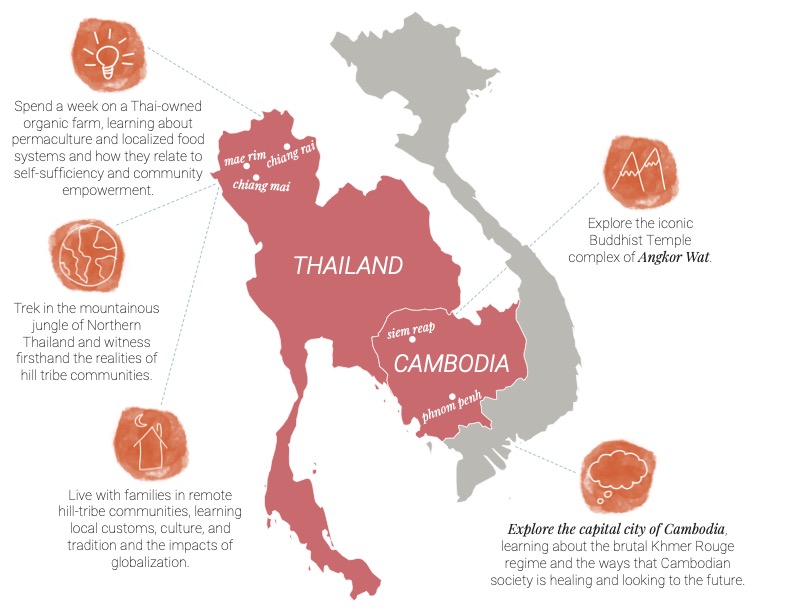
Program Details
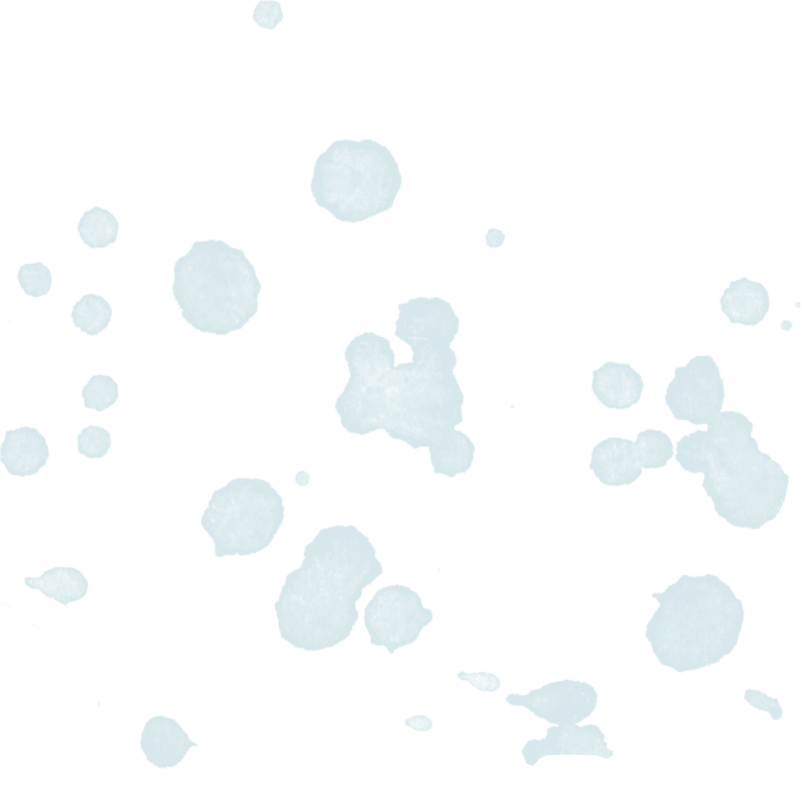
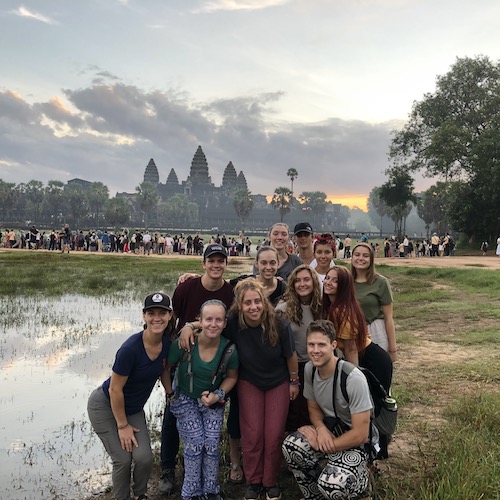
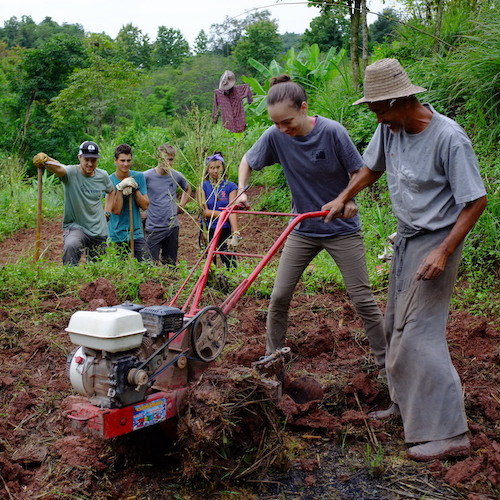

Length
42 days
Program Dates *
Fall 2024
October 2 - November 13
Spring 2025
March 6 - April 17
* Dates may fluctuate depending on flight times and availability.
Group Size
A maximum of 13 Students & 2 Overseas Educators
Eligibility
Our typical student is between 17-22, though we sometimes work with students slightly outside that range depending on circumstances.
College Credit & Scholarships
Learn more about: College Credit and Scholarships
College credit is available, however students pursuing credit will be required to attend the otherwise optional pre-departure virtual sessions (typically 3-4 sessions).
Language Requirements
None
Cost
Fall 2024 (42 days): $9,900
Spring 2025 (42 days): $9,900
Program tuition includes all planned meals, accommodations, scheduled program activities, internal program transport, and international medical+evacuation insurance for the duration of the program. International airfare (est. $1,300-$1,500), internal flight (est. $150-$250), visa fees (est. $120) and spending money (est. $200) are extra.
Climate Nutritional Facts
Being aware of our footprint is a great first step. Learning what to do about it, is ahead. To start mitigating the extra carbon of your trip, students are encouraged to consider eating a low-meat diet, purchasing locally-made green products, using public transit where available, and talking to their local community and politicians about climate change.
During this program students will "inset" much of their carbon through volunteer projects. Students will eat and drink from typically immediately local sources, staying in housing that supports local entrepreneurs and communities, and learning about ways to better the environment that can be taken home.

About Our Southeast Asia Semester
Southeast Asia is a land of ancient tradition, distinctive cultural expression, and tremendous complexity.
Defying European colonization, Thailand provides a unique opportunity to witness a culture uninterrupted by external authority, yet deeply impacted by globalization and tourism. We explore various aspects of this culture, enjoying the warmth and hospitality of Thai people while uncovering layers of social complexity, economic disparities, and the endangered ways nomadic hill tribe communities live.
Cambodia is a land of contrasts, from grand temples at Angkor Wat to the genocide of the Khmer Rouge, students will get the opportunity to witness how Cambodian society continues to heal from this era and marvel at the resilience of local peoples while acknowledging how impacts have endured and shaped modern culture.
We’ll explore traditional village life through homestays in both Thailand and Cambodia where we will live with and engage in the daily life of locals. We’ll witness the emphasis on close family systems inherent in Thai culture and life in the floating villages in Cambodia. We will learn mindfulness and meditation practices from local monks while exploring the role that Theravada Buddhism plays in the lives of locals.
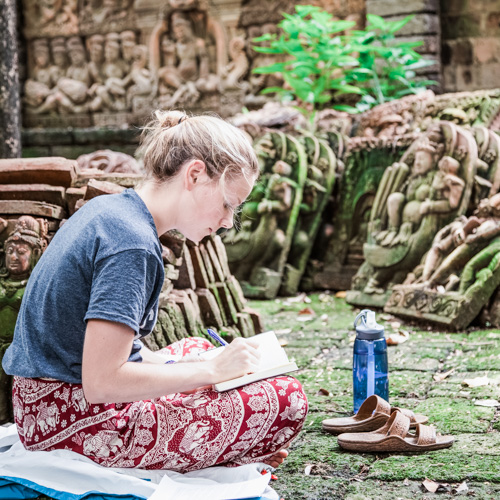
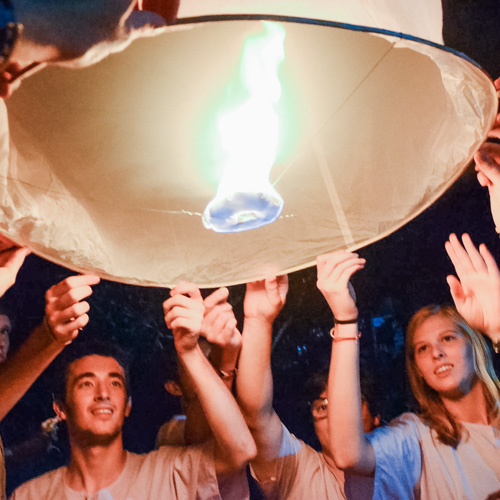
Week 1: Arrive in Phnom Phen. After taking a day to recover from jetlag, you will make your way to Vitamin Air, a community made up of young Cambodians. Here, you will connect with the inspiring dreamers building Vitamin Air, an intentional community dedicated to resilience and regeneration. Your nights will be spent in tents under the open sky. During your days, you will get to connect with nature and the traditional Cambodian way of living as you learn from your host how to cook food and live in relationship with your surroundings.
Week 2: Visit the sites of Phnom Phen. Your group will take in the solemn sites of Tuol Sleng and the Killing Fields as you learn about the not-so-distant genocide that took place in Cambodia. See the celebrations of life, where young Cambodians meet and mingle and learn about an NGO using breakdancing to give kids opportunity. After a few nights in the bustling city, go to the Floating Villages where you will spend four nights on the Tonle Sap, living with a community that does everything on their boats. Learn about some of the challenges affecting their and other communities on the lake, and meet with local NGOs working to address them. During your time there, you will contribute to environmental and educational projects.
Week 3: Go up the Mekong to Battambang. Here you will join with a local NGO project and offer your support to the dedicated team that is working to engage and educate local kids. Learn about their mission and help out with needed infrastructure projects. Visit this area's world-famous circus and get out to explore the quiet surroundings. Our host will help to deepen your understanding of Cambodian history and culture. Before leaving Cambodia, spend a final few days in Siem Reap, where you will visit the World Heritage sites at Angkor Wat and learn about the country's recent history and efforts to reconcile.
Week 4: Spend a week in an ecovillage as you participate in all of the community's daily activities: such as yoga, natural building, and conversations on regenerative agriculture. Explore creative solutions to natural living and sustainability. Enjoy a relaxing pace as you explore what it's like to live in a community dedicated to sustainability.
Week 5: Take the overnight train to Bangkok, where you will explore this bustling city from its early history to the fast-paced energy that defines it today. Visit the famous temples and palaces as well and learn from expert practitioners of Thai massage. Our host here will provide you with a modern Buddhist-activist lens. After a few days in the hustle and bustle, retreat to an Ashram on the outskirts of Bangkok to meditate and immerse in a spiritual community actively experimenting with life in balance to natural.
Week 6: Travel to the south of Thailand and the famous beaches and islands that dot the coast. Take the boat to Koh Tao, an island famed for its marine life. Settle into your new home as you get SCUBA certified and learn about marine biology. In the final few days, you and your cohort will choose through some Self-Directed Travel, where to go and what to do - applying all the learnings of your program to the real world. This coastal setting is a great place to close out your semester and celebrate how far you have come with new friends.
*Carpe Diem reserves the right to make changes to the program at any time, and indeed has the responsibility to do so in some instances; changes may be required to provide the best possible experience, protect the safety of participants, or respond to changes in weather or political conditions.
Questions We'll Explore:
- What does human migration look like in Southeast Asia? What leads to people leaving their homes and families in search of a better life. What conditions do they face as they seek to find safety. What can be done?
- How are communities in Southeast Asia approaching sustainability? What traditional practices can be revived to allow us to live in harmony with our natural world.
- How are identities formed? What role does a country's history play in its people's identities? What does this mean for marginalized groups?
- How can we be agents of change? What inner work needs to happen? What outer action needs to be taken? How can Buddhist practices help us approach creating change for ourselves and others?
Carpe Diem Education’s Southeast Asia semester brings you face to face with the beauty and challenge of these two distinctive nations. Through living and engaging with local communities, the journey provides an enhanced perspective on issues of human rights, cultural preservation and sustainability. By focusing on the resilience of communities and the land, we learn not only about the current problems, but also the proactive and life-affirming ways that we can overcome current and future challenges. The Southeast Asia semester allows you to engage with change makers in these countries as you gain skills to apply these concepts back home.
Testimonials
"JUST DO IT! There'll definitely be some difficult moments, but you're strong enough to make it through! Go out there, have experiences, and HAVE FUN!"
-Laura,
CDE Student
"I have grown more than I thought possible, and I will never forget what I’ve learned on this trip."
-Elizabeth,
CDE Student

